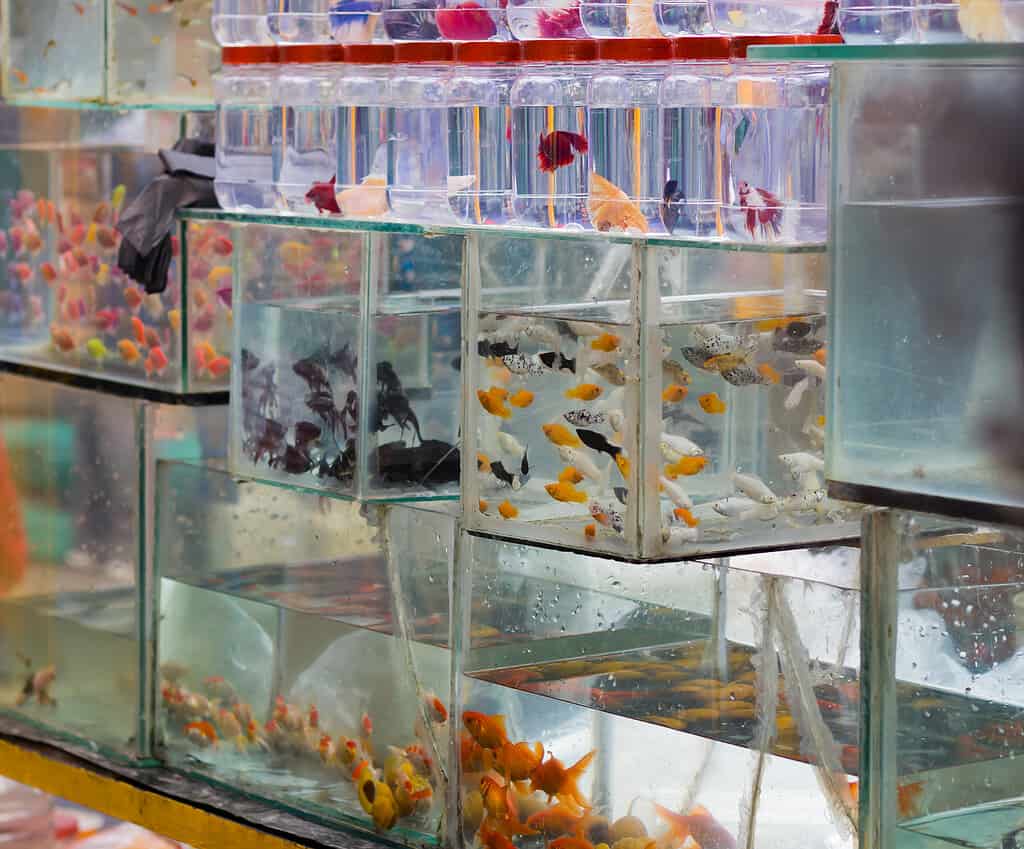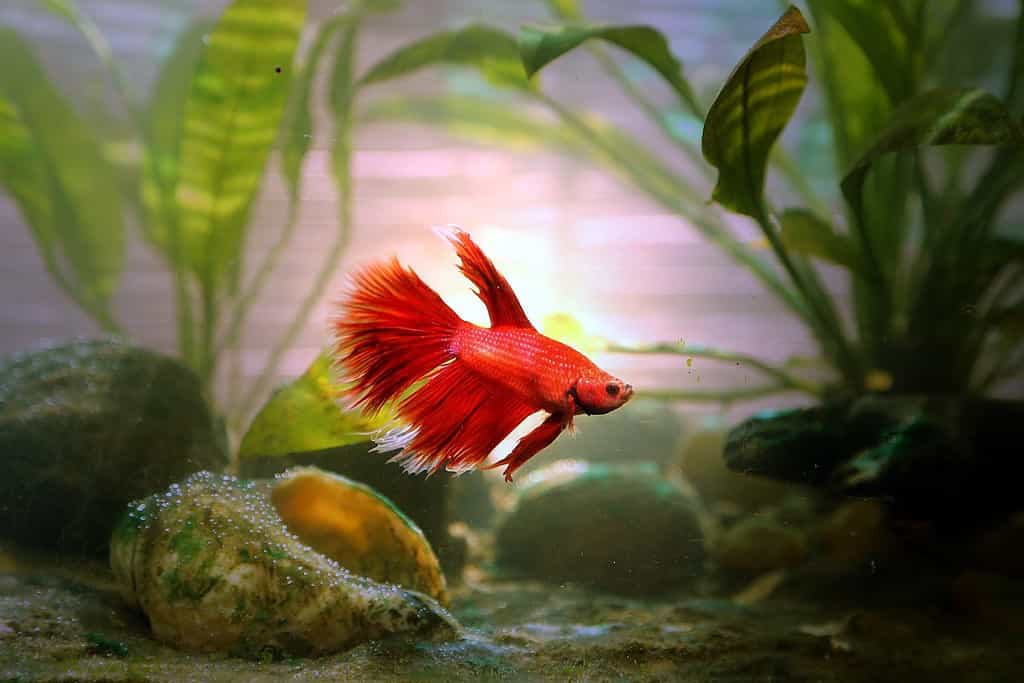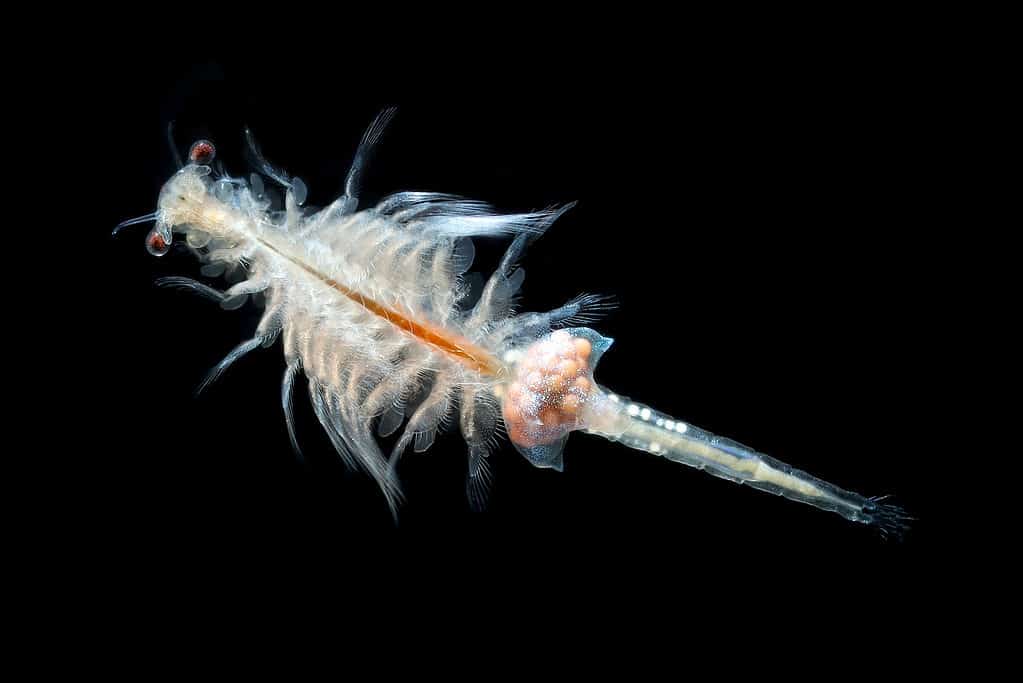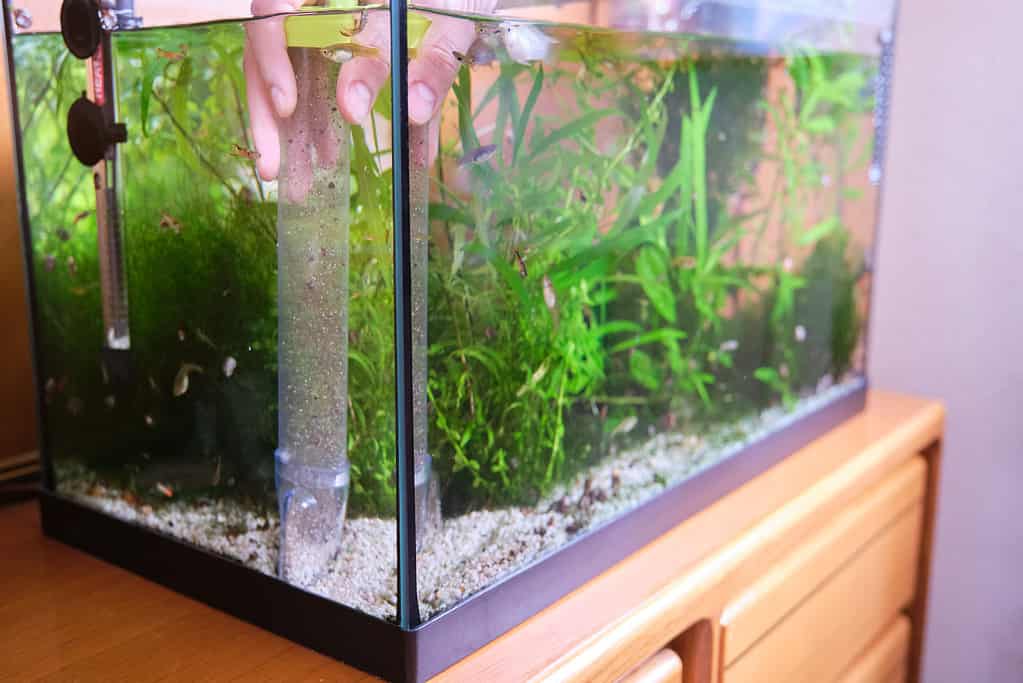Do Betta Fish Need a Filter? 5 Critical Care Tips for a Healthy Fish
Almost any pet store you encounter will have brightly colored, dazzling betta fish. Bettas are often sold in tiny cups without filtration or movement, leading people to believe they can thrive under such low-maintenance conditions. However, these are not conditions that are best for the animal. Betta fish do need a filter, despite many depictions of them living in tiny, unfiltered habitats. While bettas are relatively low-maintenance fish, you will still need some basic equipment to care for them. Here are the most critical care tips to keep your betta fish healthy and happy.
1. Choose an Appropriately Sized Tank

Tiny, bare tanks offer little in the form of enrichment or room for your fish to move around. Additionally, they get dirty more easily and require more maintenance.
©Suparna Hazra/iStock via Getty Images
Bettas and goldfish are some of the most popular fish for beginners (and even seasoned aquarists) to have. They are abundant and relatively cheap, and many times the conditions they are in at stores might make new betta parents think they’re a set-it-and-forget-it pet. This is not the case, and bettas are healthiest in aquariums at least 5 gallons or larger. Aquariums of this size have multiple benefits: they are large enough to accommodate filters and a water heater, if necessary, and they give your fish room to move around. Larger tanks also have more room for plants and decorations or areas to hide to enrich your betta’s life.
2. Optimal Tank Parameters

If the water parameters are out of whack it can lead to a plethora of health problems for your betta fish.
©Ivan-balvan/ via Getty Images
Tanks should be in a somewhat static state when it comes to temperature, pH, and water hardness. Some variance in temperature and pH range is tolerable. Other variables such as ammonia, nitrate, and nitrite levels need to be monitored. If you’re not paying attention to these factors in the water, it can easily make your betta more susceptible to disease, stress, or even death. New tanks benefit from a test for these parameters weekly, then once monthly, or even once every other month. If there are any strange occurrences or behaviors with the fish, testing the water should be one of the first steps in identifying the problem.
The ideal water parameters for most betta fish are:
- pH level between 6.8-7.6
- Temperature between 76°F – 82°F (if your household temperatures fluctuate greatly, consider getting a water heater for the tank to maintain this temperature range as cold water can kill a betta)
- 0 ppm ammonia and nitrite
- Less than 20 ppm nitrate
- Water hardness between 5-15 dGH
Test kits to test the water are readily available at many fish stores or online. They are also easy to use and a great resource for new aquarists.
3. Minimize Tank Mates

Avoid keeping bettas with other bettas or fish that occupy the same space in the tank.
©MANU PARADY/Shutterstock.com
Male betta fish and female betta fish can have similar companions, but generally, you shouldn’t house a male and female together unless they’re breeding. In that case, separating the male from the female after breeding is necessary to avoid fighting. After all, they don’t have the nickname “fighting fish” for no reason! Female bettas can live together in “sororities” of 4-6 individuals, but males are best on their own.
Picking a good tank mate
A good tip when keeping betta fish is to not house your betta with fish that are smaller than its mouth. This is because they are likely to become a snack for your fish. Any other fish you might house with the betta should be faster than it to avoid bullying. Some bottom dwellers, like a plecostomus, are out of the way and too large to be a target for bettas. However, each betta can have its personality and temperament; some might enjoy a tank mate or two, and others might not tolerate it at all. If you do add tank mates, be sure the size of the tank is large enough to accommodate both fish’s needs. Similar water parameters, like temperature and pH, are also necessary to successfully cohabitate.
When selecting a new fish to add to your tank, be sure it is looking healthy and active, as fish can spread some illnesses to each other. Purchasing from reputable sources can also prove to be valuable when it comes to your fish’s overall health and longevity.
4. Find the Right Diet

Brine shrimp (AKA sea monkies) are a favorite treat of betta fish.
©Dan Olsen/Shutterstock.com
Poor diet, underfeeding, or overfeeding can cause issues leading to illness, injury, or death in a betta fish. Underfeeding can, of course, lead to starvation. A diet lacking the nutrients it needs will have the same effect. Overfeeding, while it might come from a good place, can lead to stress, bloating, obesity, and death. Uneaten food in the tank will rot, which can alter the levels of ammonia and nitrite. These are chemicals which bettas are very sensitive to. Additionally, old food can lead to clogged filters and fungi or bacteria.
Betta flakes or food specially formulated for a betta’s needs are the best. You can supplement their diet with “treats” of freeze-dried or frozen blood worms or brine shrimp. The brine shrimp can even be kept alive to encourage your betta to hunt!
5. Maintain Regular Water Changes

Cleaning the debris from your betta’s tank and doing regular water changes can help keep your fish healthy.
©Ladanifer/iStock via Getty Images
This is a critical tip in keeping your betta fish healthy and hardy against illness and disease. You can perform 10-20% water changes weekly to maintain a clean tank without disturbing the water (or your fish) too much. Water should be treated and at the appropriate temperature to avoid shocking your betta. Under circumstances of illness or high chemical levels, 50% water changes might be needed until the issue is under control. If you have a highly planted tank you might need to do a 25-30% water change every week or every other week to minimize algae growth.
The photo featured at the top of this post is © KSeventeen/Shutterstock.com









